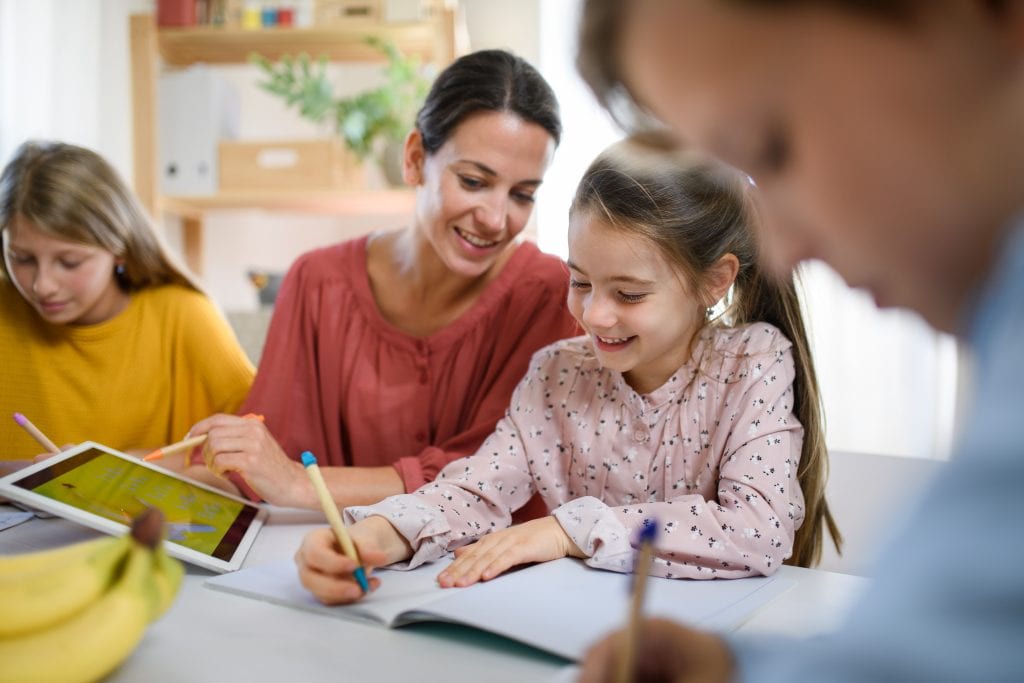Over the summer, it seemed like everyone and their sister was talking about forming a “pod” for their kids. And around the country, many families did, for a variety of reasons, in a number of ways. Some did it out of necessity, and others did it out of choice. Some chose to “go remote” and others were looking for community (and in some cases, tutoring) while their schools were virtual. Still others decided to homeschool this year. We decided to reach out to some “pod moms” from HeyMama, a community of working moms that The Local Moms Network is a part of, to find out what their pod experience has been like over the past two months.
It Has Offered Consistency
Cara Zelas is an author, educator, curriculum writer and founder of World of Little Dude, whose family splits time between NYC and Sydney. She chose to do a pod with a private teacher. “While we were in New York, we had a pod with one other family—one child who went to school with my daughter last year. We met 3 times a week, 10am-3pm. I wanted our family in a small pod as the school year was so disruptive and I wanted some consistency,” explains Cara, who has a young baby and also liked being able to minimize germs as well as COVID. “We loved the pod. It gave my daughter structure and socialization which was much missed while schools were closed.”
It Limited COVID Exposure
“We did the pod for health reasons—all of us have immunocompromised family and kids,” says Zabina Bhasin, LA, CA, physician (not practicing at moment) and founder, In KidZ xx with love. Their pod includes five kids in the pre-school/Pre-K range that meet at least 3 times a week to supplement at home learning. “We do pre-school craft activities…[and] activities like science, cooking, art, language, and computers for the older two,” says Zabina.
It Helped During a Transition Year
Some moms were wary of starting a new school (particularly for younger kids) when teachers were wearing masks. This, in addition to the consistency issue, was one of the reasons Elyssa Katz chose to host a pod for her 3-year-old daughter and 3 others. “I felt that it would be hard for my daughter to transition to school and then have to stop should someone get COVID. I was not worried about COVID but more about my daughter’s social emotional development. She was going to be attending a new school and the idea of her teachers and friends in masks made me feel uneasy. The other families in our pod had similar feelings and it made the decision quite easy,” says Elyssa, who is founder of The Zutor Concierge, a matchmaking service between families and educators. Her pod shares a veteran preschool teacher and the day is structured like a typical preschool—just in a more intimate setting.
It Helped Working Moms Manage
There has been much written about the effect of the pandemic on women in the workforce, and it makes sense that pods would appeal to working moms in need of consistent childcare and help with remote learning. “All three of the moms in our pod are working moms, and we too needed to ensure that we, too, would be able to work,” notes Amy Frank Goldman, Founder and President of AFG Wealth Management, who lives in Hoboken, NY. Her pod consists of three 1stgraders who meet 4 days a week with a private tutor. “She helps administer and elevate the public school remote learning curriculum. She has added Spanish, cooking and lots of outdoor activities including science based nature walks,” says Amy. Like the other moms, she says consistency has been another plus to a pod. “We are all anticipating that schools will shut down again and want our children to get into a routine and stay in a routine,” says Amy. She adds: “There were many times when she didn’t want to go to school last year, many battles during home school and many days where she was visibly sad not to see her friends. Now she has a nice intimate crew, all three of which have become very good friends. Which is yet another positive for a single child.”

